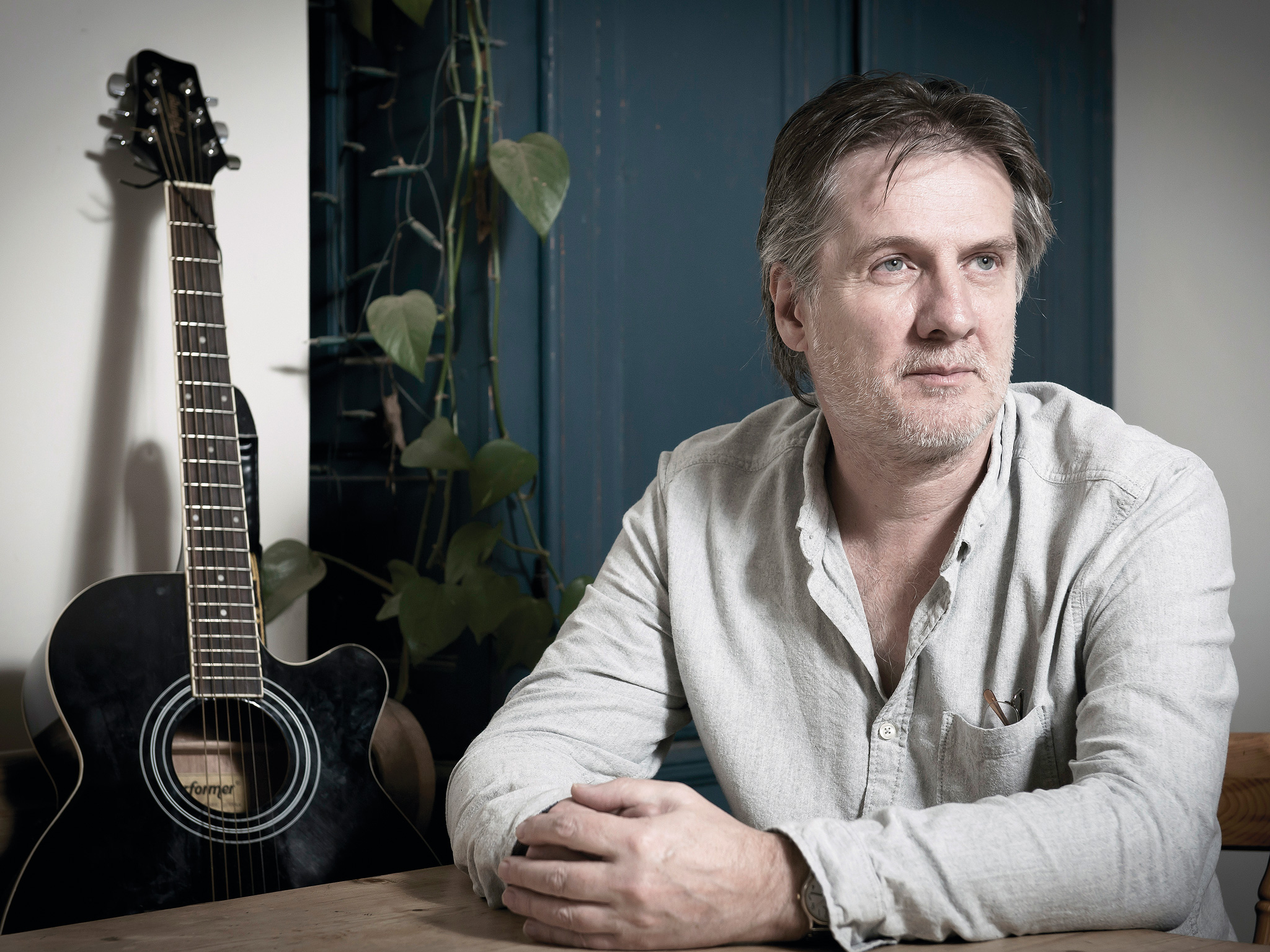Andy Jackson’s solo album could have just as easily been called Lessons In Perseverance, or maybe even The Endless Journey.
Enjoying a rare moment of calm outside one of London’s many coffee houses, he explains: “I have a need to keep moving forwards, and I don’t just mean by achieving things I know I can already do but also attempting things I can’t. I think you have to be prepared to fail and start again to get the most value from life.”
The themes of facing challenges and starting again are recurrent throughout this interview as Jackson discusses the personal philosophies that have helped shape his solo album, Signal To Noise. Prog fans will know him as one of Pink Floyd’s engineers – he has been part of their camp since the early 80s – but he has far more strings to his bow than that. His teenage music collection was stuffed with records by Floyd, Genesis and Frank Zappa, all of whom inspired him to start playing guitar and join local prog-fusion bands. But when it came to deciding his future career, it was a friend who suggested sound engineering. “It was a light-bulb moment,” Jackson smiles, and reveals how he was successful in securing an apprenticeship at London’s prestigious Utopia Studios, where he trained under James Guthrie.
It was he who recommended Jackson when additional engineers were sought for 1981’s feature-length movie The Wall, and the rest, as they say, is history.
Fast-forward to the present day and Jackson’s little black book is crammed with a host of influential names. His back catalogue includes prog goth rockers Fields Of The Nephilim and, more recently, Tim Bowness. He briefly ran the small label Tube Recordings, and even played guitar alongside Nephilim bassist Tony Pettitt in The Eden House. Yet despite his rich roster, he felt something was missing and wanted to play more towards his own personal tastes. The turning point really came when his personal life hit the rocks part way through his work with The Eden House – his marriage fell apart and he ended up moving out of his home in North London, leaving much of his old life behind.
“I felt like I didn’t belong anywhere,” he reveals. “I embarked on new relationships and was dealing with the dynamics of that as a middle-aged guy; I was taking on things that were difficult.”
It was against this cloudy landscape 18 months ago that Signal To Noise flared into existence. Crafted during gaps in The Endless River’s schedule, it fuses his prog rock roots with modern progressive sounds to create a sort of The Division Bell meets Steven Wilson hybrid that confirms his position as a credible solo artist.
Some aspects of the process came easily – the playing and mixing – while others created hurdles that Jackson leapt over with panache. The first of these was writing the songs themselves, and he found he wasn’t as lost for words as he’d first assumed.
“I’d never really written lyrics before,” he reveals, “although there was one song on The Eden House’s Half Life album which I co-wrote with [Tony’s wife] Meghan-Noel Pettitt via email. I remembered reading about how Richard Curtis wrote Blackadder via fax so I suggested we try a similar method and it was a really interesting process. I tried it again with my girlfriend, who’s an English graduate, and it really worked. That got me going and I started writing on my own.”
Jackson’s welcome embrace of these challenges is inspiring and it’s one that’s no doubt been fed by the many philosophers, fellow artists and authors he quotes during this interview. Their words and views helped shape his final lyrics, in particular those of Albert Camus, whose essay The Myth Of Sisyphus lends itself to the cover art.
“With his fruitless task of rolling the rock up the hill, it becomes about the effort involved, not the outcome,” Jackson explains, “and that’s a great analogy for life. One of my favourite tracks is Brownian Motion, which takes the idea that most of the time that’s how we live, like [George Cockcroft’s novel] The Dice Man. The things we choose are random and we’re just buffeted about by life.”
The album’s title and loose concept are metaphors for the personal journey Jackson undertook in order to create his seven-track composition. He admits the whole process has given him a new perspective on so many different aspects of his life.
“I’m exploring music in a different way, which may sound like an odd thing to say but it is true. If I never heard anything new again, there’s still so much depth I can get out of what I already own because I’m thinking about it in new ways. How do the chord sequences work? What does the vocal melody do? Trying to do vocals myself informed me what it was really like to stick a pair of headphones on and sing – I’d only ever thought of it from the point of view of getting to the goal.
“I remember reading an interview with Robert Wyatt where he was asked how he managed to write such good songs and he replied: ‘Because I’ve got such a great record collection.’ I thought that was really interesting – it’s not about plagiarism but being informed of the possibilities.”
This was the approach Jackson used when working on album opener The Boy In The Forest, which was inspired by the chord progression in Glen Campbell’s Wichita Lineman. “I really like some of the detail in the way he moves from one place to the next,” he says. “I played around with it, changed the order, played it backwards. It seems an unlikely source but I started with the guitar and it led me into a song.”
As if learning how to write lyrics wasn’t a big enough challenge, Jackson then faced learning how to sing them. He considered different vocalists but felt his written words were so personal that he needed to sing them himself. He visited a vocal coach, took an online course and eventually was satisfied with the results of his own hard work.
“Was Mozart a genius because he was born that way or because he was playing piano from the age of two and his father was standing over him with a stick, beating him if he stopped?” Jackson ponders. “It’s the 10,000 hours principle – I’m sure that being good at something is a combination of innate talent and hard work. I’ve come across so many people that I admire and they work like hell.”
As testament to his efforts, the album features no guest musicians and is 100 per cent Andy Jackson, unlike his previous collaborative release Obvious, which he refers to as “an abortive attempt”. Of course, now he’s met these challenges, surely it’s time to create new ones for the follow-up, which he’s already started on?
“I’d like to ideally do the next one as more of a band project,” he says. “I’d like to get three people together and play it live I wanna keep moving. I’d love to do four albums a year, like Zappa – I love the way he worked. He was really prolific but he was also a brilliant freak. Maybe it’s a challenge I need to set myself.”
Of course, there are those cynics who may have a momentary lapse of reason and suggest he’s deliberately chosen to release Signal To Noise to coincide with The Endless River. In fact, Jackson fields calls about the final mixes from Pink Floyd’s management during our interview, but the musician-engineer is more philosophical. “The two albums were finished around the same time – the only way not to be cynical was not to release it and what’s the point of that? I was mindful of the timing with the Floyd album but it was fortunate more than anything.”
By pure chance, he also showed his musicianship on the latter album, contributing bass to one of the songs.
Signal To Noise almost feels like both a musical and psychological experiment that neatly paves the way to the next curious chapter of self-discovery. Unravelling the story behind his journey and viewing his world from a new vantage point, Jackson provides a real sense of him emerging as an artist in his own right, not just as a talent in the background.
“I’m on a roll now,” he confirms. “I read about how Nick Cave used to go into his office six days a week until he couldn’t stand it any more. Now he goes in on Sundays as well. For me, even if I don’t have to work on a certain day, then I’ll still do something productive and I definitely feel better for it psychologically.”
Signal To Noise is out on November 3 via Esoteric. See andyjacksonmusic.com.


